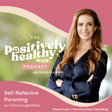
Family Dynamics
In this heartfelt episode of The Positively Healthy Mom Podcast, I sit down with Anastasia Arauz, a seasoned expert in family dynamics, child development, and play therapy. Anastasia brings a wealth of experience from her years as a middle school teacher, elementary school counselor, and certified play therapist to the table, offering invaluable insights for parents navigating the complex world of family life.
Anastasia's journey began with a degree in Elementary Education from Appalachian State University, followed by a Master of Arts in Counseling from North Carolina Central University. Her passion for helping children and families led her to further specialize in Couples and Family Counseling at UNC Greensboro, where she earned a Post-Master Certificate. Anastasia’s dedication to the well-being of families is evident in her work, including her private practice in Jacksonville, NC, and her commitment to play therapy, where she served on the Board of the North Carolina Association of Play Therapy.
During our conversation, Anastasia shares her expertise on creating a balanced and healthy family system, with a particular focus on how parents can foster positive relationships with their children. She offers practical advice on managing the inevitable challenges that come with parenting and emphasizes the importance of understanding each family member's unique role within the family dynamic.
For moms listening, this episode is a treasure trove of wisdom on how to build a supportive, nurturing environment for your family. Anastasia’s approach combines professional knowledge with a deep empathy for the struggles parents face today, making her insights both relatable and actionable.
Key takeaways from this episode include:
- Understanding the different roles within a family and how they impact overall dynamics.
- The significance of play in child development and how it can be used as a therapeutic tool.
- Strategies for fostering open communication and emotional resilience within the family.
- Tips for parents on how to maintain their own well-being while managing family responsibilities.
Whether you're a new mom or a seasoned parent, Anastasia’s guidance will inspire you to look at your family dynamics with fresh eyes and equip you with tools to create a more harmonious home life.
Positively Healthy Coaching
The Positively Healthy Mom FB Group





